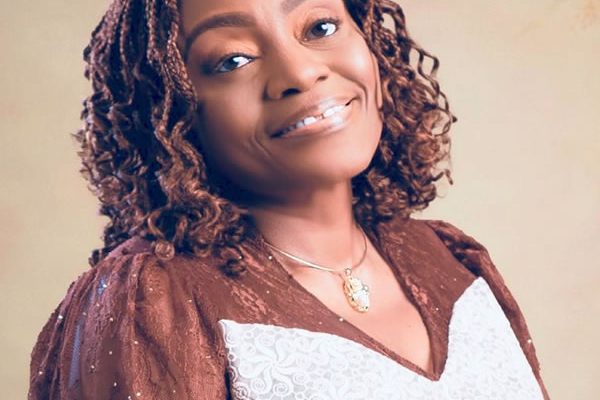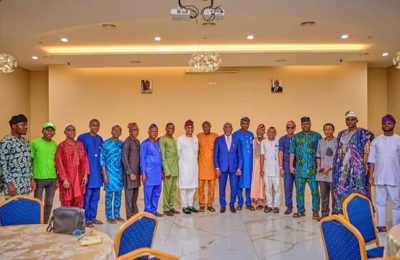Yeye Bunmi Dipo-Salami is a developmental strategist, gender justice and women’s rights advocate, and the Executive Director of BAOBAB for Women’s Human Rights. Between 2010 and 2014, she was the Special Adviser to Ekiti State governor, Dr Kayode Fayemi, on Planning, MDGs and Development Relations, and later the Commissioner for Integration and Intergovernmental Affairs. In this interview by Kingsley Alumona, she speaks about her career in politics, women’s leadership and political engagement in Nigeria, among others.
Since you graduated from the university, you have ventured into many endeavours — teaching, lecturing, women’s rights advocacy, consulting, politics, etc. Looking back, are you happy with the choices you have made regarding your career and personal life?
As a daughter of two teachers, I love imparting knowledge in and out of the classroom, and I am grateful to God who has walked with me every step of the way in the choice of the man I married, because he supports me to be me, cheering me on every step of the way.

The experience garnered from the different sectors of the economy where I have worked has led me from one point to another, strengthening me and giving me a very broad and positive view of the world.
At what point did you decide that politics was the next thing for you? What inspired you to make that decision?
Moving into the political sector wasn’t much of a plan for me. It just came and I embraced it. I would say that politics found me because Dr Kayode Fayemi became the governor of Ekiti State. I had known him and his wife, Erelu Bisi Fayemi in the development sector — and, because I trusted their capacity for facilitating transformative change, I was so glad when they invited me on board. I am grateful to them for the opportunity to have a firsthand experience of the sector because had they not invited me, I would have been programming for women’s meaningful participation in politics from a theoretical perspective instead of from experience like I presently do.

Between 2010 and 2014, you were the Special Adviser to Ekiti State governor on Planning, MDGs (now SDGs) and Development Relations, and later Commissioner for Integration and Intergovernmental Affairs. In what ways did you leverage these positions to champion the cause and socio-political agendas of women in the state?
I tried my best to ensure that women’s issues were addressed even though I never held a gender portfolio at any point. What that administration did was to have an MDGs-based development strategy. Then, Ekiti State was known for having that template that enabled the government to draw linkages between MDG 3 which sought to promote gender equality and empower women and the other seven goals which covered other facets of life. We had clarity of how that can boost the economy, impact the environment, alleviate poverty, ensure the empowerment of vulnerable groups, guarantee the education and health of children. It was a lot, but having a First Lady — who lived and breathed gender justice and equality — made it seem effortless.
When you were in government, how would you describe the way women were treated in terms of political appointments with respect to their male counterparts? Did you see the then Ekiti government as being inclusive and fair in this regard?
Ekiti is a deeply patriarchal state as with all parts of Nigeria. It is a state where we also have very strong women who are not afraid to bring their voices to the table. We had a governor who believed in the capacity of women and worked for their progress, recognising that having more women in government would lead to significant outcomes in the state.
We only had a handful of women compared to men in that administration. That notwithstanding, they constituted a force because they were strong, knowledgeable, experienced, and exposed. They held major portfolios, delivered effectively on their mandates and created impact.
It is worthy of note that a government doesn’t operate in a vacuum, and as expected, some structures and systems stood against the inclusion of women. However, the governor was not deterred. That was intentionality at play.
In your political service to the Ekiti State government, what major achievement or impact did you make that would be remembered for a long time?
I believe that I will be remembered for different things given the various interconnected roles I played in that administration. I midwifed the MDG-based Development Strategy as described earlier, supported the governor to bring development partners back to the state, and implemented approved MDG projects across the state — poverty reduction, education, health and water access in a respectful, respectable and inclusive manner. I coordinated the establishment of and the effective preparation of the strategic documents for the Development Agenda for Western Nigeria (DAWN), a strategy that was agreed upon by the governments of the six states in the South-West for the cohesion, prosperity and sustainable development of the zone.
Since you left government, you have been active in gender advocacy, feminism, leadership training, political activism, women empowerment, etc. How do you do all these, given that they require funds and logistics to execute?
All the things I have been involved in are components of the same thing — the advancement of the rights of women. We have been lucky at BAOBAB for Women’s Human Rights to build a pool of partners who trust our strategies and processes enough to support our work in different ways. They see the results of our intervention — the progress we make in the communities we serve and are inspired strongly to do more for and with us.
A few weeks ago, BAOBAB — the organisation you work for as its Executive Director — organised a political sensitisation workshop for Nigerian southwest women on the need for them to fully participate in public and political leadership. Why do you think the sensitisation or charge is imperative now?
The strategic workshop held in Ibadan in July was not just about the need for them to fully participate but about strategising to overcome the barriers to women’s full participation. The challenge is not that women do not want to participate, it’s the fact that the system is biased against them, making their meaningful participation in political processes difficult. Though women constitute almost 50 per cent of the population, they represent less than four per cent in governance. That is the focus of the strategic conversations which will take place across the country in the build-up to the 2027 elections to ensure Nigeria’s progress, especially at this time the economy is practically in shambles.
At the workshop, you said women should start playing politics like men, and that the goal of the workshop was to get as many women as possible into positions of power, not just about good governance. What do you mean by all these?
Absolutely! We cannot advocate the full participation of women yet craft different rules of engagement for women, faulting the strategies of men who have total control of the political space. It is true that good governance will open the space to more women. It is also true that having more women in governance will engender good governance. As you well know, there are more individuals and groups programming around or campaigning for good governance in Nigeria than those working for women’s inclusion. If all the groups and networks working for good governance would also campaign to bring an end to women’s underrepresentation, the bottlenecks would have been dismantled by now.
There are laws and policies that encourage women’s participation in public and political activities, and women tend to vote more during elections in Nigeria. Why are female politicians not leveraging these legal frameworks and potential female voters to seize power from men? What do you think is the problem?
Yes, we have national laws and policies as well as regional and international treaties that promote women’s active participation and inclusion in public and political life. These include the 1999 Constitution (as amended), the National Gender Policy, the Protocol to the African Charter on Human and People’s Rights on the Rights of Women in Africa (Maputo Protocol), the Convention on the Elimination of All Forms of Discrimination against Women (CEDAW), among others. Oftentimes, female politicians are not aware of the existence of these laws, nor do they demand their implementation even when they are aware.
I know that every political party has a gender policy as required by INEC. However, the implementation of these policies by any of the 19 parties remains to be seen.
You once said that countries with under-representation of women in legislative and executive positions usually experience slow progress. I believe you would be happy if Nigeria produced a female president. If that happens, what major impact do you think a female president could make in the country?
Yes, evidence shows that countries led by women experience peace, prosperity, stability and happiness. A competent, emotionally intelligent, well-networked, strategic and patriotic female president will bring about a significant difference in our lives. With her comprehensive understanding of the people’s needs due to her socialisation, she will unite the nation, bring about good governance and lead us on the path of progress.
President Bola Tinubu has said that he would look into the demands of those clamouring for the review of the constitution. If you were to be among those who would review the Constitution, what major things would you recommend in favour of women?
I will recommend the removal of all explicit provisions that discriminate against women and the sexist language in the Constitution, and the domestication of regional and international instruments that provide essential guidelines for protecting and promoting women’s rights to political participation. They should be fully integrated into our legal system.
READ ALSO: Customs seizes donkey skin, machetes, tramadol, others worth N8.1bn in Ogun, Oyo







